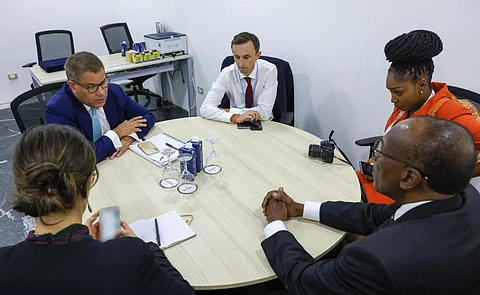Equity, unabated coal phasedown in first draft of COP27 ‘Cover Decision’; other elements missing
The Presidency of the 27th Conference of Parties (COP27) to the United Nations Framework Convention on Climate Change (UNFCCC) produced a ‘non-paper’ on the morning of November 17, 2022. It did so by compiling inputs from various countries, with the intent of producing a cover decision.
The cover decision summarises the overarching narratives across the conference and provides guidance for how action should proceed after. At COP26 in Glasgow, the cover decision came to be known as the Glasgow Climate Pact (GCP), which made history for being the first-ever COP decision to mention the term ‘fossil fuels’.
To begin with, the Egyptian document is currently 20 pages long, compared with the GCP which was eight pages.
During a consultation with Heads of Delegation (HOD), many Parties complained about receiving such a lengthy document so late in the conference timeline, with only one official conference day remaining to negotiate on the text line by line.
The document has extensive sections on the energy crisis, Intergovernmental Panel on Climate Change report findings and multilateral development banks (MDBs). It is thus a laundry list of suggestions collating many themes both within and beyond the scope of the UNFCCC.
It captures the war-driven mood of the moment and highlights “the urgency to rapidly transform energy systems to be more secure, reliable, and resilient”. This is a reference to energy security, which is a key priority for most countries right now.
It calls for a shift towards renewables and phasedown of unabated coal power. On fossil fuel subsidies, it appears to water down GCP language. The GCP called for a phaseout of inefficient fossil fuel subsidies, while the COP27 non-paper states the need to “phase out and rationalise inefficient fossil fuel subsidies”.
The document reiterates the equity principles of the UNFCCC and the 2015 Paris Agreement despite resistance from many countries such as the United States, Switzerland and Australia. It also calls out developed countries’ failure to sufficiently cut emissions.
In a new addition that came as a surprise to many, it calls for the establishment of a new work programme on just transition. At the HOD meeting, the United Kingdom (UK) highlighted that just transition is already being discussed in the Mitigation Work Programme and is yet to be agreed upon.
On the UN’s REDD+ programme, it supports offering more finance for REDD+ results assessed and verified under Article 5.2 of the Paris Agreement, to help countries meet their nationally determined contributions (NDC) and net zero goals.
It also allows the submission of REDD+ in bilateral trades under Article 6.2 — a fact that was called out to be a pre-judgement by Archie Young of the UK, since the negotiations on this issue are still underway at COP27.
On finance, it “expresses grave concern” that the $100 billion climate finance goal has not been met by developed countries, and reiterates the goal of doubling adaptation finance according to the GCP from COP26.
On the issue of loss and damage, the document has extensive language on growing costs and indebtedness due to loss and damage, as well as non-UNFCCC mechanisms such as the Global Climate Risk Shield and Insuresilience.
However, the main ask of developing countries — a loss and damage finance facility to be established at COP27 — is missing due to ongoing tough negotiations on the issue.
Barbados, speaking on behalf of AOSIS at the HOD meeting, said they are disheartened by how the new loss and damage agenda item has been managed.
So far, no negotiating text has been produced. No time has been allocated for formal negotiations on the matter, and no joint contact groups formed. Every other agenda item has been given time to negotiate, and we demand the same courtesy be given to this item so critical for us, the speaker for Barbados added.
The document is also missing India’s call for a phasedown of all fossil fuels. In fact, the reference to fossil fuel subsidies being rationalised is the only mention of fossil fuels in the document. This is a fact that makes the non-paper unambitious, many say, given that a fossil fuel phaseout out is critical to achieve the 1.5°C target.
At the HOD meeting, the G77 and China bloc said the document does not clarify the direction of travel of the climate talks.
Bolivia said there must not be a reinterpretation of the Paris Agreement through this cover decision. making it an unwanted top-down approach. It added that the financial obligations of developed countries cannot be diluted.
The Arab Group suggested that instead of targeting specific energy sources, the document should target emissions instead, guided by the goals of energy security and economic prosperity.
Multiple Parties took issue with the inclusion of non-UNFCCC schemes such as the International Civil Aviation Organization and the International Maritime Organization.
China said the section on the reform of MDBs must be deleted since it is “beyond the mandate of this process and is an issue of global financial governance”.
The US asked for the addition of language on the “relevance of those Parties that contribute most to global emissions and their role in helping us get to the right trajectory”.
It also seemed to suggest that it agreed with language on the $100 billion goal and doubling of adaptation finance, but that “meaningful mitigation” and updates to ambition in NDCs must also accompany any calls for more finance.
The COP27 Presidency will now work on converting the non-paper into an actual draft of the cover decision. But concerns continue to grow about the timely closure of the conference by November 18 evening, owing to the number of disagreements that are likely to emerge.


